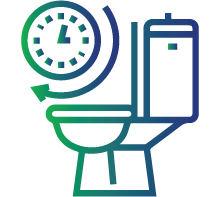
Microalbumin Creatinine Ratio, Spot Urine
Microalbumin Creatinine Ratio, Spot Urine
A microalbumin creatinine ratio, spot urine test is used to determine whether your urine sample contains very small amounts of the protein albumin. One of the initial indications of kidney disease may be small amounts of albumin in the urine, also known as microalbumin. Early detection of kidney disease allows for treatment before the disease worsens.
The main protein found in blood is albumin. When healthy kidneys remove waste from your blood, little filters stop large albumin molecules from leaving your body with urine. Typically, only a tiny amount of albumin or none at all will pass through the filters. Larger amounts of albumin may pass into your urine if your kidneys are compromised.
Creatinine is a typical waste product found in urine and is a result of daily muscle wear and tear. A microalbumin creatinine ratio test evaluates the ratio between the albumin and creatinine levels in your urine. The amount of albumin in your urine can also be determined more precisely using this test. Thus, getting this test done is recommended for screening and diagnosis of kidney disease.
The test uses a single urine sample, also referred to as a "spot" sample to measure albumin and creatinine. A chemical byproduct of regular muscle activity called creatinine is normally excreted from the body through urine. This albumin-to-creatinine ratio test is an alternative method to determine your total daily urine albumin level without collecting a complete 24-hour urine sample because total daily creatinine production is generally consistent.
This test is also known as ACR, Microalbumin-Creatinine Ratio, UACR Albumin-Creatinine Ratio
Symptoms of kidney damage

Nausea and vomiting

Loss of appetite

Fatigue

Sleep problems

Urinating more or less

Swelling of feet and ankles

Dry, itchy skin

High blood pressure
Who should get tested?
A microalbumin creatinine ratio, spot urine test is recommended for adults who have one or more of the following risk factors for kidney disease

Having high blood pressure

Having a family history of chronic kidney disease

Being obese

Smoking cigarettes

Having cardiovascular disease

Belonging to a particular race or ethnicity
Preparation for the test
Ensure your doctor is aware about what prescription drugs, over-the-counter medicines, or dietary supplements you are taking. Refrain from eating meat for a day before your microalbumin creatinine ratio test as meat can affect your creatine levels. Ask your doctor for details about pre-test preparations, and make sure to follow instructions closely
Interpretation of results
The units of measurement for the results are milligrams (mg) of albumin per gram (g) of creatinine
|
Protein |
Normal range in urine |
|
Albumin: Creatinine ratio (ACR) |
0 to 30 mg/g |
Deviation from normal levels indicates the following:
· ACR levels less than 30 mg/g is considered normal.
· ACR levels between 30 to 300 mg/g might be indicative of early kidney disease.
· ACR levels of more than 300 mg/g might be indicative of more advanced kidney disease
FAQs
How is the sample collected for a microalbumin creatinine ratio, spot urine test2. What are the risks involved in a micr?
A urine sample is used for this test. You will be given a sterile container by your healthcare provider to collect a urine sample. A urine sample may need to be provided at a specific time.
Midstream urine collection is the proper technique for taking a urine sample. The first few urine drops should be discarded because they could contain microorganisms that are present on the genital surface. It is advised that you clean the area around your genitalia before taking a urine sample
2. What are the risks involved in a microalbumin creatinine ratio, spot urine test sample collection?
Urine sample collection for microalbumin creatinine ratio, spot urine test does not pose any risks
What is the turnaround time (TAT) for the result of a microalbumin creatinine ratio, spot urine test?
What factors can affect the microalbumin creatinine ratio, spot urine test results?
Factors such as exercise, inflammation in the body, fever, and specific medications can all temporarily raise albumin levels
What happens in the case of abnormal microalbumin creatinine ratio, spot urine test result?
Typically, you will undergo two additional tests in three to six months following your initial test. Your kidney disease may be in its early stages if two out of three tests reveal abnormally high levels of albumin in your urine. Your doctor will usually order additional kidney tests if your test result is abnormal, like an estimated glomerular filtration rate (eGFR) blood test to evaluate the status of your kidney’s health

